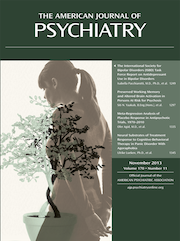Preserved Working Memory and Altered Brain Activation in Persons at Risk for Psychosis
Abstract
Objective
Patients with schizophrenia exhibit impairments in working memory that often appear in attenuated form in persons at high risk for the illness. The authors hypothesized that deviations in task-related brain activation and deactivation would occur in persons with an at-risk mental state performing a working memory task that entailed the maintenance and manipulation of letters.
Method
Participants at ultra high risk for developing psychosis (N=60), identified using the Comprehensive Assessment of At-Risk Mental States, and healthy comparison subjects (N=38) 14 to 29 years of age underwent functional MRI while performing a verbal working memory task. Group differences in brain activation were identified using analysis of covariance.
Results
The two groups did not show significant differences in speed or accuracy of performance, even after accounting for differences in education. Irrespective of task condition, at-risk participants exhibited significantly less activation than healthy comparison subjects in the left anterior insula. During letter manipulation, at-risk persons exhibited greater task-related deactivation within the default-mode network than comparison subjects. Region-of-interest analysis in the at-risk group revealed significantly greater right dorsolateral prefrontal cortex activation during manipulation of letters.
Conclusions
Despite comparable behavioral performance, at-risk participants performing a verbal working memory task exhibited altered brain activation compared with healthy subjects. These findings demonstrate an altered pattern of brain activation in at-risk persons that contains elements of reduced function as well as compensation.



